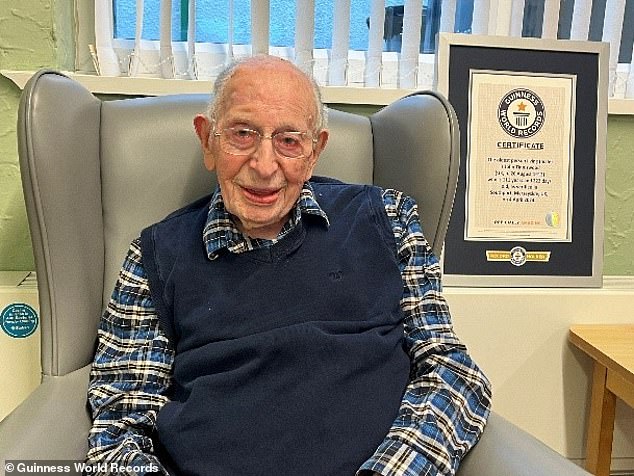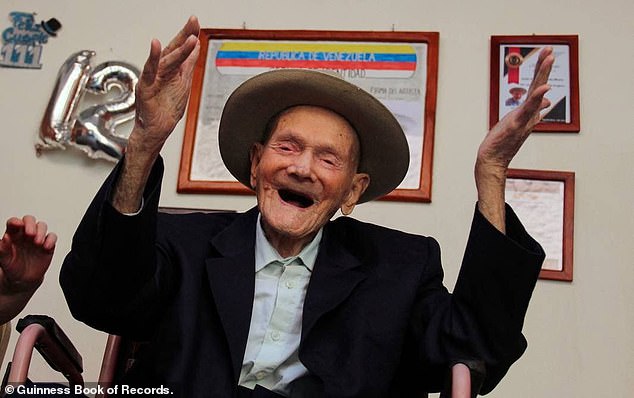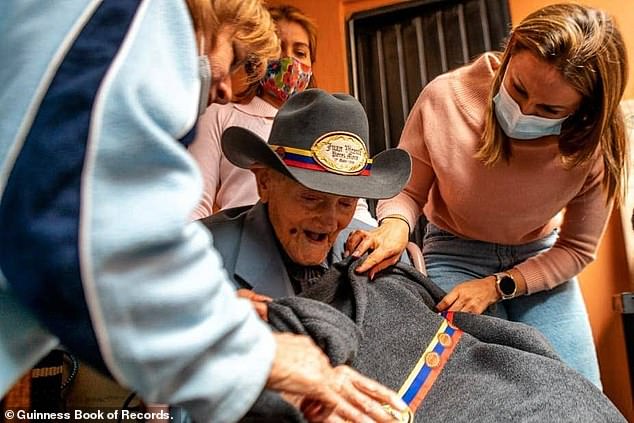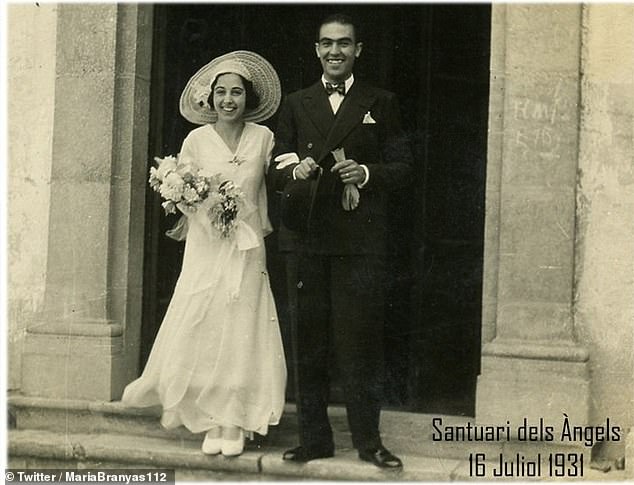As world’s oldest man turns 112, scientists reveal two secrets to longevity – but also explain why we shouldn’t follow health advice from a centenarian
With the world’s oldest man, John Tinniswood, turning 112 today, many of us may be wondering what the secret is to an exceptionally long life.
Mr Tinniswood from Merseyside says he has stayed alive so long thanks to fish and chips, while others cite sleep and home cooking as secrets to reaching the 100-year mark.
While the world’s oldest people may think they have all the answers, scientists warn you should think twice before following their advice.
From a daily sip of spirits to regular visits to the snack bar, some advice from the world’s oldest people may be useless or even bad for your health.
Professor Richard Faragher, an expert on ageing at the University of Brighton, told MailOnline: ‘It’s probably not a good idea to take the health tips from these people.’
John Tinniswood was born in Liverpool on August 26, 1912, the year the Titanic sank, and became the world’s oldest living man in April. He says there’s nothing special about him

Like Mr Tinniswood, who will celebrate his 110th birthday with his carers at his care home in 2022, experts suggest some people make it to 100 thanks to nothing more than luck
Many of the world’s oldest people believe that their longevity is due to a particular habit or lifestyle.
Spain’s Maria Branyas Morera, who was the world’s oldest person until her death earlier this month, attributed her longevity to positivitya good relationship with family and nature, but also ‘staying away from toxic people’ and ’emotional stability’.
Others, such as John Tinniswood – the world’s oldest man at 112 – argue that diet can be an important factor in their continued good health.
Mr Tinniswood, born in Liverpool in 1912 and living in Southport, became the world’s oldest man in April and celebrates his 112th birthday today.
He says he owes his long life to eating “everything in moderation” and his daily portion of breaded fish and chips.
The former oldest man in the world, Juan Vicente Perez Mora, who has died aged 116, also suggested that his diet was a factor, citing his daily glass of aguardiente, a liqueur made from sugar cane, as a major factor.
However, according to Professor Faragher, trying to imitate the lifestyle of the world’s oldest people is pointless, or at worst even harmful.
Experts still don’t know exactly why some people can live so long, but Professor Faragher explains that there are two possible reasons, which are not mutually exclusive.
The first theory is that people who live extremely long lives are genetically different.
According to Professor Faragher, centenarians live so long because they have remained healthy for most of their lives.
Mrs. Morera’s family previously indicated that the super-centenarian was in virtually impeccable health.

Venezuelan Juan Vicente Perez Mora died two months before his 115th birthday. During his life, he said he drank a glass of aguardiente, a sugar cane liqueur, every day

However, experts believe that Mr. Mora’s long life is due to an unknown genetic factor rather than specific health choices.
Her daughter Rosa Moret said on regional Catalan television in 2023: “She has never been to hospital, she has never broken any bones, she is fine and she is not in pain.”
The waters get even murkier with the second possible explanation for why people live so long: they’re just really, really lucky.
“The key question is whether they are fundamentally different genes or whether they are the luckiest people in the world,” adds Professor Faragher.
When centenarians are asked about the secret to a long life, they often mention certain habits, such as eating fish and chips, believing in God, drinking spirits or getting eight hours of sleep.
But it is not necessarily these habits that make people live so long. Others have had these habits and have therefore lived shorter. This is also called ‘survivorship bias’.

Maria Branyas Morera (pictured) passed away this month at the age of 117. Many wonder how Mrs. Morera managed to live so long

Mrs. Morera, pictured here at her wedding to Catalan doctor Joan Moret at the age of 23 in 1931, attributed her long life to positivity and avoiding “poisonous people”
In other words, if someone lives to be 112 years old and eats fish and chips every day, then you can easily assume that he lives to be that old because he eats fish and chips.
But just because someone has a certain habit and lives a long life, there is no reason to assume that one habit causes the other.
In fact, many of the world’s oldest people may live past 100 despite their lifestyle, not because of it.
Interestingly, this is a view shared by John Tinniswood, who said, “You either live long or you live short and there’s not much you can do about it.”

Experts say you shouldn’t follow the health advice of the world’s oldest people because it probably won’t help you. Pictured is the world’s oldest woman, Tomiko Itooka, celebrating her 116th birthday. She is currently the oldest living person in the world
Several centenarians also smoke. For example, a 112-year-old Nepalese woman, Batuli Lamichhane, smoked 30 cigarettes a day.
This is clearly at odds with population studies on smoking and life expectancy, and we should not assume that smoking is the cause of Mrs Lamichhane’s long life.
Professor Faragher says you should not follow their advice, regardless of whether it is genetics, sheer luck or a combination of both that has allowed these people to survive for so long.
He explains: ‘If they’re genetically different, it’s of no use to you. And if they’re incredibly lucky, chances are you’re not.’
“If you want to stay healthy, you probably shouldn’t follow the advice of centenarians.”

Batuli Lamichhane, one of the oldest people in the world at 112, smokes 30 cigarettes a day. Scientists say the fact that she lived a long time while smoking is not an indication that smoking contributes to longevity
This means that there is not much point in drinking a glass of spirits every day. It probably won’t help you live longer and it may even make you unhealthier.
An exception to this rule is when a centenarian’s advice matches what we know about healthy life expectancy at the population level.
For example, when someone like the then 114-year-old Elizabeth Francis said that you should avoid alcohol, maintain friendships and exercise regularly – that is still good advice.
Experts say the best way to add a few extra years to your life is to address the simple factors that affect your health, such as diet and exercise, rather than following very specific advice.
Professor Faragher concludes: ‘I see myself as a down-to-earth person, so my advice is always to do the basics first.
‘Before people start wondering what great supplement they should be taking, forget about the curry and six pints of beer.’
